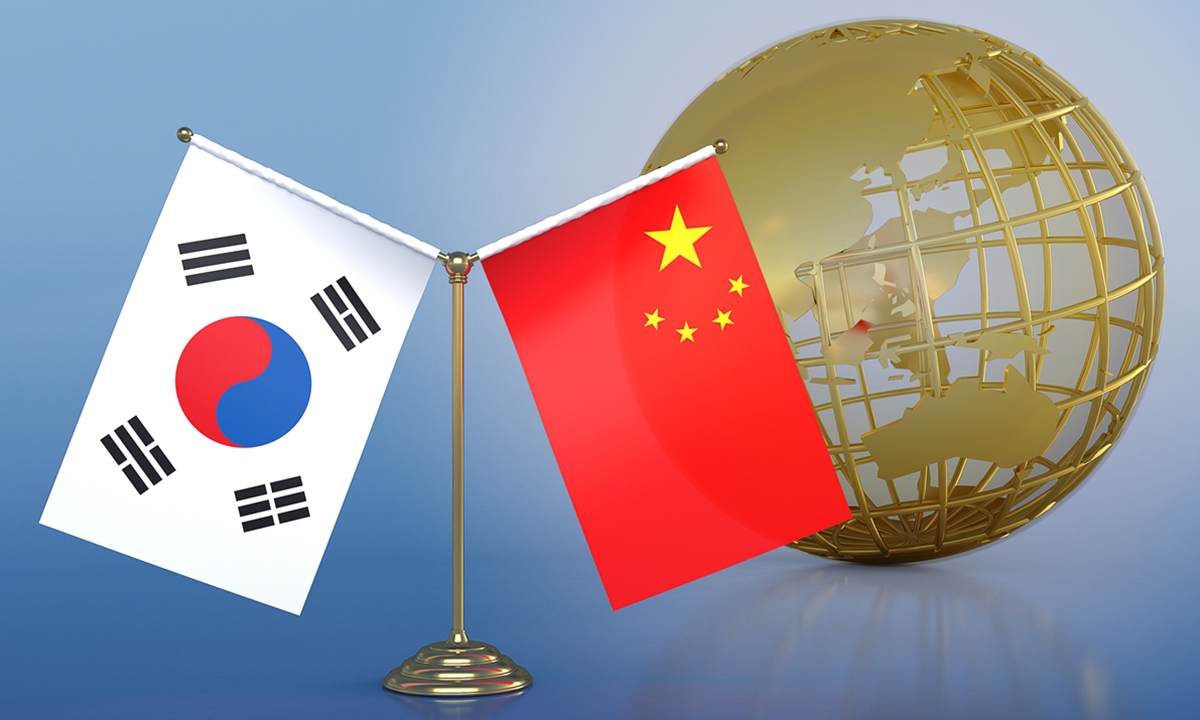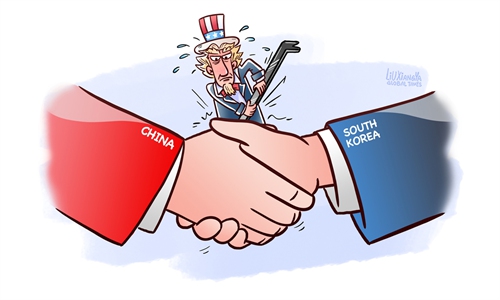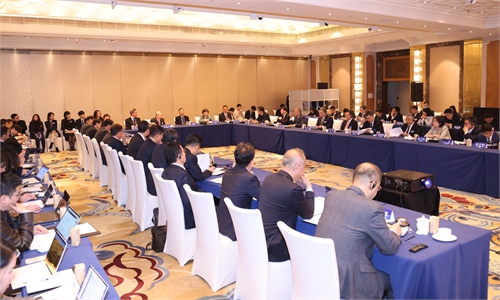South Korean FM’s China visit to inject stability into bilateral economic relations
Seoul should maintain policy independence from Washington to unleash more cooperation potential: analysts

China South Korea Photo:VCG
South Korean Foreign Minister Cho Tae-yul is visiting China on Monday and Tuesday at the invitation of Chinese Foreign Minister Wang Yi, also a member of the Political Bureau of the Communist Party of China Central Committee. This is the first trip to China by a South Korean foreign minister in more than six years.
The visit comes at a time when the development of relations between China and South Korea has deteriorated and the momentum of bilateral economic cooperation has shown signs of stagnation. Observers said these were the dire consequences of Seoul blindly following Washington's policy of decoupling from China.
While the much-anticipated trip is expected to lead to some consensus between the two neighbors and inject a certain level of stability into bilateral economic relations, Chinese observers called for the South Korean side to show more sincerity in the course of its exchanges with China.
If the Asian economy could maintain policy independence from the US, the outlook for bilateral economic cooperation could be much brighter, analysts stressed, highlighting high-tech, tourism, education and eldercare as sectors full of development potential.
During a meeting with the heads of South Korean enterprises in China on Monday, Cho noted that recent changes in economic and trade relations between China and South Korea have "posed severe challenges" for South Korean businesses, and he also pledged to actively engage in "economic diplomacy" with China, the Yonhap News Agency reported on Monday.
The ongoing visit by the foreign minister marks a pivotal moment in China-South Korea economic and trade relations, following partial disruptions due to the pandemic. South Korean enterprises operating in China have warmly embraced the visit, underscoring its importance in "fostering confidence for business growth in China and indicating promising prospects," a director surnamed Jin of the External Cooperation Department at the Korea Chamber of Commerce in China told the Global Times on Monday.
South Korean companies have consistently prioritized the Chinese market globally, highlighting its strategic importance on a global scale. This visit is expected to reaffirm the enduring partnership between the two countries' businesses, and it will set the stage for enhanced confidence and growth in bilateral economic ties, Jin added.
Observers said the visit sends a clear signal that South Korean businesses, amid the country's sluggish economic situation, look to maintain and expand cooperation with China. Also, South Korea's new foreign minister must "have been well prepared for the China visit," and it is expected that certain issues that hinder the development of bilateral economic relations could be addressed through open communication and handled more "rationally and objectively."
Last year, South Korea recorded a trade deficit with China, the first in more than 30 years, although China remained South Korea's largest trading partner. South Korea's exports of semiconductors and related equipment to China slumped to $66.2 billion in 2023, down from $82.4 billion in 2018, equivalent to a reduction of nearly 20 percent, according to a report by the Maeil Business Newspaper.
Since President Yoon Suk-yeol took office, South Korea has diplomatically leaned more toward the US and Japan, distancing itself from China. On the economic front, Seoul joined the US-led blockade to suppress China's tech and economic rise, which eventually backfired on its trade-dependent economy, Lü Xiang, research fellow at the Chinese Academy of Social Sciences, told the Global Times on Monday.
"Semiconductors are the largest tech export items of South Korea, and China is the largest buyer of South Korea's chips," Lü said, citing South Korea's chip export curbs on China as a key reason behind its overall slump in exports to China.
"In the semiconductor supply chain, South Korea is at the upstream while China sits at the downstream. The two countries also enjoy geographic proximity. What other country in the neighborhood could have a substitute market as large as China to accommodate South Korea's high-tech shipments?" Lü asked.
Cho's visit, coming amid differences in positions on some hot issues and clashes of public sentiment, is seen as a "proactive" initiative by the South Korean side to enhance effective communication and reduce trade friction with China, analysts said.
"China is showing sincerity in promoting the development of bilateral relations, and we also anticipate an equal level of sincerity, at least, from South Korea. The fallout of the decoupling push from China is clearly in sight, so we anticipate that Seoul could form a sober assessment of the situation and achieve a balance in its economic relations between China and the US," Lü noted.
If the two sides can reach a certain consensus through dialogue, it will significantly enhance economic cooperation and improve both public opinion and the stability of South Korea's economy, Zhang Huizhi, director of the Institute for North Korea and South Korea Studies at the Northeast Asian Research Institute of Jilin University, told the Global Times on Monday.
This will not only reassure South Korean businesses but also set a solid foundation for future collaboration, according to Zhang. She also called on the South Korean government to handle its discourse with China from the pragmatic perspective of protecting local businesses' interests.
A business representative from CJ China said that he firmly believes that China and South Korea could formulate a win-win strategy in the next three decades, as the Chinese market has benefited the economies of both countries over the past 30 years, the Yonhap report said. The remarks were made during the meeting with Cho on Monday.
According to analysts, there is plenty of room for the two countries to deepen cooperation if bilateral relations stabilize. Lü pointed to areas such as tourism, education and people-to-people exchanges.
"The two neighbors could also jointly explore solutions to low birth rates and aging populations," he said. Lü also noted that more cooperation could be tapped under the China-Japan-South Korea trilateral cooperation mechanism.



